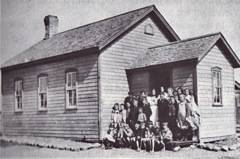Books have been written and movies have been made in celebration of that most revered of pioneer institutions - the one-room schoolhouse.

Aside from the fact that the teacher taught all of the grades in the one classroom, there were other aspects of rural education that are worth noting.
Today, Canadian students attend school in the fall, winter and spring, and take the summer off. Each province mandates not only the starting and closing dates, but the exact number of days that constitute a school year. The pioneers had no such rules. The whole management of education was a much less formal process.
First, there was the issue of winter travel and its dangers. It just made no sense to put children through that, so school was more of a fair weather activity. Then there was the difficulty of getting teachers.
Single young women were the sought-after choice as teachers. In fact many jurisdictions specifically ruled out married women in the position.
Why was that? Were the pioneers just old fashioned when it came to the roles of women? Perhaps, but no more so than in other parts of the world.
Consider this statement made by a British judge in 1925:
"The duty of a married woman is primarily to look after her domestic concerns and it is impossible for her to do so and to effectively and satisfactorily act as a teacher at the same time."
One would hope that many Manitobans had a more enlightened view, but marriage was often followed by pregnancy. Not only did some people not want a pregnant woman teaching, there was the problem of having them quit in the middle of a term. That sort of thinking persisted for quite a while.
But staff turnover was high even with single female teachers. Pioneer communities just happened to have a surplus of single male homesteaders and farm hands. So just when the new teacher was learning the ropes and settling in, sure enough some local bachelor would be knocking on the door.
Maybe that was part of the plan? If so, it worked. The roster of teachers in country schools reveals quite a bit of turnover and a succession of single girls. A closer look at family histories will turn up quite few accounts such as; “He married Edith King, a former teacher at North Antler School.” In fact one oft-repeated rule states that, “Women teachers who marry or engage in improper conduct will be dismissed.” “Improper conduct” wasn’t always clearly defined but one jurisdiction included the reminder that, “You may not dress in bright colours.”
Male teachers had a bit more freedom. In fact one set of rules states that they might “spend one evening each week for courting purposes.” But then males usually moved on to more lucrative occupations as soon as they could. Some even turned to farming.
Remember that in the early days these schools were funded locally by a population that was largely struggling to make ends meet. They made real sacrifices so that their children could get an education.
The teacher generally boarded with a nearby family. During the depression she often moved from home to home on a regular basis. Fifteen dollars per month was then applied to the land taxes of the host family, while the teacher received $30 per month salary. At times school might be temporarily closed due to low enrolment or lack of a teacher. During the depression there might be closings for a while when there was not enough tax revenue to keep operating. Like so many pioneer undertakings, it was largely about doing what could be done under the circumstances.
As one leafs through the local histories the fond memories are everywhere. I’ll share just one of my own.
I attended Rosehill School, near Baldur. We had a great toboggan hill just across the road. All winter long we spent every recess and noon hour on that hill. I visited the site recently and was struck by something I hadn’t thought of before. It was, as I said, across the road – on private property. It faced away from the school so even had our teacher been watching from the school window we were out of sight, unsupervised.
I seem to have attained the necessary literacy and numeracy, and … I never did mind going to school.
. . . . .
Author: Ken Storie
Sources:
Brenda History Committee. Bridging Brenda Vol. 1. Altona. Friesen Printers, 1990 Hartney and District Historical Committee. A Century of Living - Melita - Arthur History Committee. Melita: Our First Century. Altona. Friesen Printers, 1983
https://www.tes.co.uk/article.aspx?storycode=342027
http://www.washingtonpost.com/blogs/answer-sheet/post/rules-for-teachers-in-1872-no-marriage-for-women-or-barber-shops-for-men/2011/06/01/AGTSSpGH_blog.html
Photos
Melita - Arthur History Committee. Melita: Our First Century. Altona. Friesen Printers, 1983. pp 259
